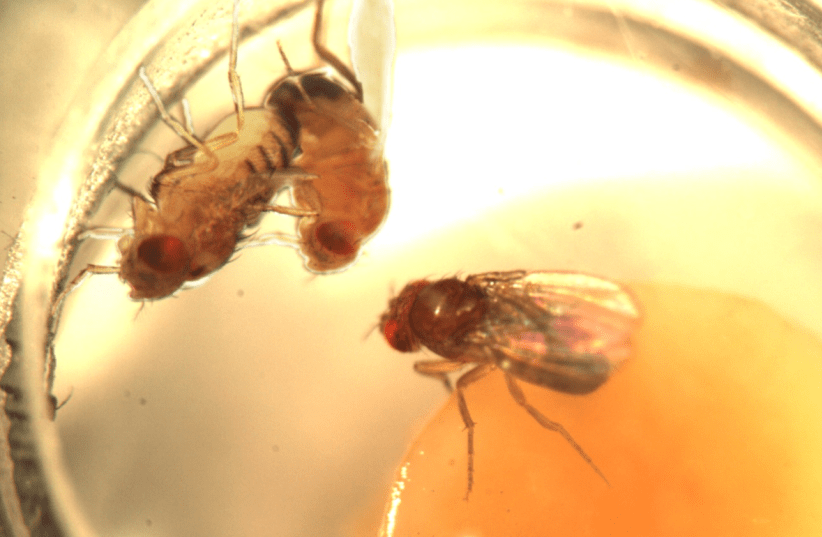Repeated sexual failures cause social stress in fruit flies, study shows
Rejected males experience frustration that impairs their ability to cope with other stresses, new Bar-Ilan University study finds
Repeated failures to reproduce make males – that is, male fruit flies – stressed and frustrated, which in turn makes them less resilient to other types of stress. Who cares about fruit flies? In fact, the bugs are regularly used as a model organism for medical research and have been for more than a century.
Today, they are the most powerful multicellular, genetic model system available for basic and medical research, as they reproduce and develop at a much faster rate than frogs, mice, or humans and have a simple nervous system.
Julia Ryvkin from the Goodman Faculty of Life Sciences at Bar-Ilan University (BIU) in Ramat Gan and colleagues have just published their study in the journal PLOS Genetics under the title “Failure to mate enhances investment in behaviors that may promote mating reward and impairs the ability to cope with stressors via a subpopulation of Neuropeptide F receptor neurons.”
Fighting for survival
Animals are motivated to take actions that improve their survival and reproduction through reward systems in the brain, but failure causes stress. The reward systems have been extensively studied, but less attention has been paid to how animals respond to failure. To investigate, researchers compared the behavior of male fruit flies (Drosophila melanogaster) that had experienced repeated sexual rejection, with males that had recently mated and naïve males that had been kept in isolation.
“Interaction with others determines the reproductive success of individuals, requires the ability to recognize opportunities to obtain natural rewards and cope with challenges that are associated with achieving them,” they wrote.
“As such, actions that promote survival and reproduction are reinforced by the brain reward system, whereas coping with the challenges associated with obtaining these rewards is mediated by stress-response pathways, the activation of which can impair health and shorten lifespan. While much research has been devoted to understanding mechanisms underlying the way by which natural rewards are processed by the reward system, less attention has been given to the consequences of failure to obtain a desirable reward.”
They found that rejected males were more active, more aggressive, and less social towards other males – indicating a frustration-like state of stress. Rejected males were also less resilient to two other types of stress: starvation and exposure to a toxic herbicide that causes oxidative damage.
To understand how this stress response is controlled in the brain, the researchers manipulated the signaling system of neuropeptide F, which is involved in reward processing and aggression. Inhibiting neuropeptide F receptors made flies less resilient against starvation, mimicking the effects of repeated sexual rejection. Using a technique called optogenetics that uses light to stimulate activity in specific cells, the team activated neuropeptide F receptor neurons and found that this also reduced the flies’ ability to withstand starvation.
“These results show for the first time that fruit flies experience social stress when their attempts to mate repeatedly fail,” says the study’s lead author Prof. Galit Shohat-Ophir, vice dean of BIU’s Goodman Faculty.
She added that their research makes it possible to further investigate social stress in a model organism with a simple nervous system, such as discovering the neuronal circuits that sense failure to mate, the molecular mechanisms that encode failures within NPF neurons, and the downstream circuits.
“As such, actions that promote survival and reproduction are reinforced by the brain reward system, whereas coping with the challenges associated with obtaining these rewards is mediated by stress-response pathways, the activation of which can impair health and shorten lifespan. While much research has been devoted to understanding mechanisms underlying the way by which natural rewards are processed by the reward system, less attention has been given to the consequences of failure to obtain a desirable reward.”
They found that rejected males were more active, more aggressive, and less social towards other males – indicating a frustration-like state of stress. Rejected males were also less resilient to two other types of stress: starvation and exposure to a toxic herbicide that causes oxidative damage.
To understand how this stress response is controlled in the brain, the researchers manipulated the signaling system of neuropeptide F, which is involved in reward processing and aggression. Inhibiting neuropeptide F receptors made flies less resilient against starvation, mimicking the effects of repeated sexual rejection. Using a technique called optogenetics that uses light to stimulate activity in specific cells, the team activated neuropeptide F receptor neurons and found that this also reduced the flies’ ability to withstand starvation.
“These results show for the first time that fruit flies experience social stress when their attempts to mate repeatedly fail,” says the study’s lead author Prof. Galit Shohat-Ophir, vice dean of BIU’s Goodman Faculty.
She added that their research makes it possible to further investigate social stress in a model organism with a simple nervous system, such as discovering the neuronal circuits that sense failure to mate, the molecular mechanisms that encode failures within NPF neurons, and the downstream circuits.
Sexual Frustration Shortens Fruit Flies' Life Spans: Study
Sexual Rejection Leads to Binge Drinking in Fruit Flies
🐪🗻 This has been an Escape From Egypt moment on DNTCCC in honor of the former Escape from Egypt channel on the Disqus channel network 2018-2019 with 34K followers and was the absolute weirdest, wackiest and strangest news channel ever on Disqus !🐪🗻
Be sure to like this page and follow us on
https://disqus.com/home/forum/definitely-not-the-chit-chat-channel-blogspot-com/



No comments:
Post a Comment